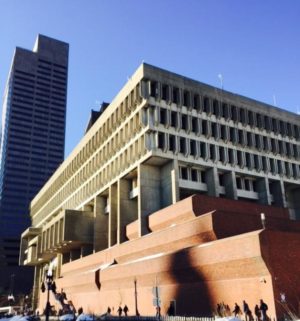At-large City Councilor Michelle Wu will be Boston’s next mayor.
City Councilor Annissa Essaibi George conceded defeat to Wu shortly after 10 p.m. Tuesday night as early results and campaign internal vote tallies showed her opponent with an insurmountable lead.
“I want to offer a great, big congratulations to Michelle Wu. She’s the first woman and first Asian American elected to be mayor of Boston. I know this is no small feat,” she told supporters in a speech at an election-night rally at the Fairmount Copley Plaza hotel in Boston, which was broadcast live by several television news channels. “I want her to show Boston how mothers get it done.”
According to final unofficial results posted by city election officials early Wednesday morning, Wu trounced Essaibi George 63.94 percent to 35.67 percent.
Essaibi George, the favored candidate of many real estate industry figures, had faced a tough challenge. She trailed Wu in the five-person preliminary race, 33.36 percent to 22.48 percent, and despite strong debate performances and an aggressive campaign that included a 36-hour stint in the race’s final days and unsavory accusations floated by political action committees supporting her, she was not able to make up the gap. After eight years as an at-large city councilor, Wu had built up a strong coalition of supporters city-wide, and acting Mayor Kim Janey’s endorsement of Wu early in the general election and her active campaigning for Wu in the heart of Boston’s Black community also helped Wu lock in her win.
How the Candidates Would Retool Real Estate
Why Boston Candidates, Banks Want to Boost HomeownershipRead the editorial board’s interview with Michelle Wu
Read the editorial board’s interview with Annissa Essaibi George
Banker & Tradesman’s Editorial Board Endorses Michelle Wu
“From every corner of our city, Boston has spoken. We are ready to meet this moment. We are ready to become a Boston for everyone. We are ready to be a Boston that doesn’t push people out, but welcomes all who call Boston home,” a beaming Wu told supporters at a post-election rally at Boston’s Cyclorama shortly before 11 p.m.
Wu will take office on Nov. 16, an accelerated timeline thanks to Janey’s status as acting mayor after former Mayor Marty Walsh was appointed to be President Joe Biden’s secretary of labor this spring.
Wu thanked Essaibi George and cast her victory as proof that voters want to “reshape what is possible” and pledged big, systemic changes as well as “change at street level”
“Boston has always been that city that punches above its weight,” she said. “Today, together, we are marching into Boston’s promise.”
At the same time Wu and Essaibi George battled for the city’s top job, many seats on the Boston City Council also turned over. Among the new arrivals is Jamaica Plain real estate broker Brian Worrell of Greater Investments Real Estate.
In polls throughout the race, voters consistently ranked high housing costs as a top issue for the next mayor to tackle. A MassINC Polling Group survey sponsored by WBUR, the Dorchester Reporter and The Boston Foundation found that only 14 percent of renters could afford to buy a home in their current neighborhood, while only 33 percent of current homeowners said they would be able to.

Michelle Wu
While both candidates have put forward plans to tackle the problem, with Essaibi George specifically throwing her support behind greater support for first-time and first-generation homebuyers, Wu has become widely known for her support of what she’s called “rent stabilization” and others have deemed “rent control.” Wu told Banker & Tradesman’s editorial board that she supported a system similar to Oregon’s where between inflation adjustments and a legislatively-set cap would give landlords substantial leeway to raise rents on a yearly basis.
When it came to permitting and development, Essaibi George said she supported Boston’s current system, albeit with tweaks and reforms to improve efficiency, while Wu endorsed a city-wide rezoning that would move more development approvals to an as-of-right process and a transition away from the current approvals process dominated by the Boston Planning & Development Agency, branded as an “abolition” of the agency.

Annissa Essaibi George
The race also drew in significant interest and financial support from the real estate industry, with many figures making large financial contributions to the Essaibi George campaign and several construction unions – although not all – throwing their support behind her, as well.
Other issues that dominated voter concerns were the state of the Boston public schools, climate change and transportation – where Wu had long ago staked out leading positions even before she ran for mayor – and homelessness.







